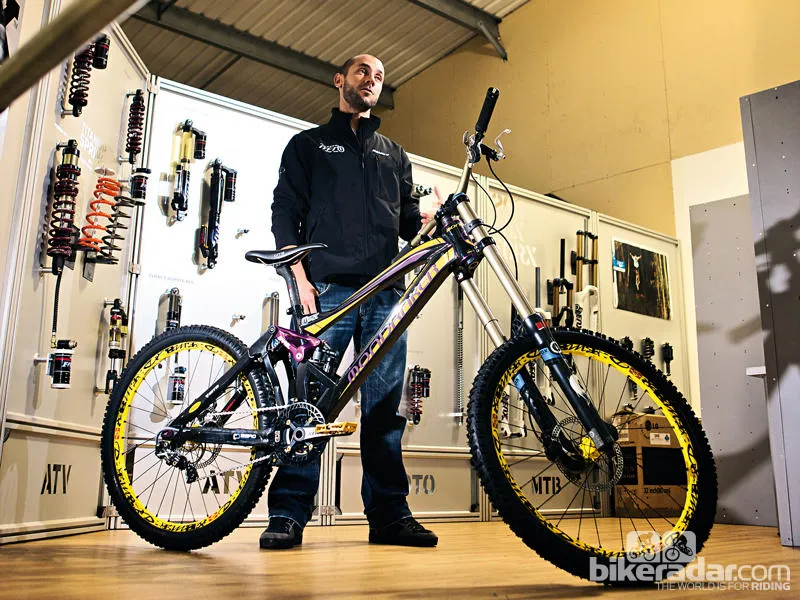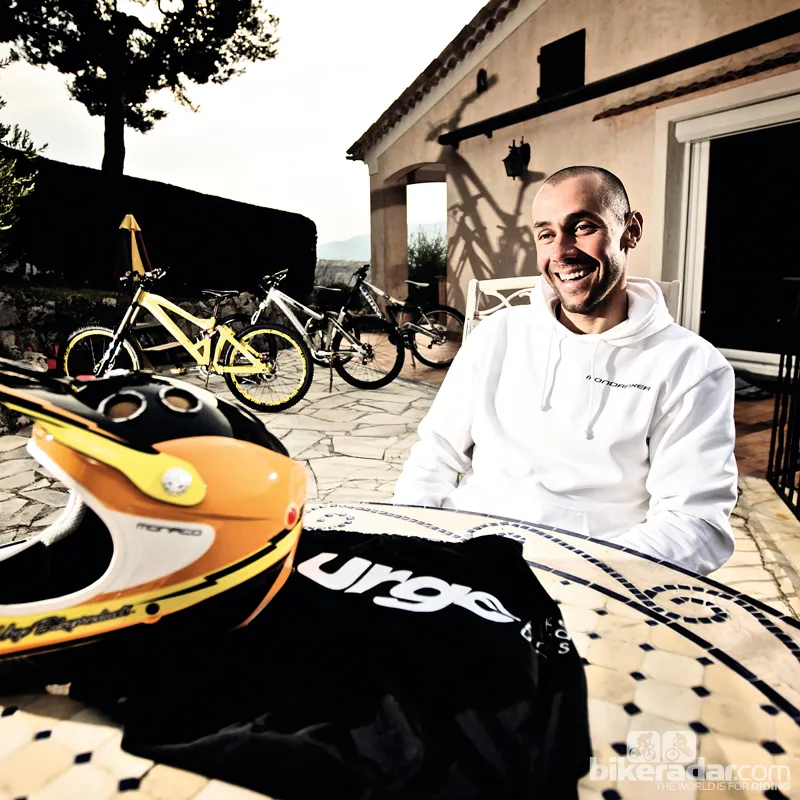Recently, Mountain Biking UK’s Ric McLaughlin met Fabien Barel, pro downhill mountain biker. The triple world champion talked to him about retirement, the day he went fastest and why he thinks Aaron Gwin is the best…
Fabien Barel paces around the bar of Le Boomerang hotel in Les Gets like a caged animal. Perpetually distracted, he struggles to stay in one place for more than a couple of minutes at any given time. His pint of cider stands on the bar untouched, a pool of its own condensation forming around its base as the bubbles slow.
The Windham World Cup is being streamed live onto the big screen. It’s the first top-flight race Fabien has seen since he announced his retirement. He flits between watching intently, pretending not to look and frantically checking his phone - he’s a ball of nerves, and a man being pulled apart.
The next morning I corner him over breakfast - how tough was the Windham viewing for him?
“Honestly?” he shakes his head and sucks in a breath. “It was super hard. It was a hard decision that I made, I did it for the right reasons and I definitely believe it was the right thing to do. I’m passionate about mountain biking, passionate about racing, and being on the side of the track is hard.”
On knowing he was going to retire
Fabien is a triple world champ and a multiple World Cup winner but is still only 32. I ask him if there was a specific moment when he knew the time had come to walk away from the sport?
“There was, of course,” he says, “The (Mondraker) Summum was perfectly dialled; mechanically the bike was perfect, and I was testing on my local trails with my mechanic, Paul, in March. I came in at the bottom of a track and I told Paul that I genuinely didn’t believe that I could go any faster than I was going.”
That must have been a massive moment for Fabien, personally?
“I realised that the momentum, the precision and the physical intensity that I was capable to give… I was reaching my limits. That was the fastest that I could be on the bike. I really felt that I had reached what I needed to.”
He points at his arm and shrugs at the goosebumps. “Life is funny sometimes, I realised that it was kind of the end of something. When I started mountain biking I wanted to be junior world champion. When I was junior world champion I wanted to be elite world champion.
“When I did that I knew that Steve [Peat] had fallen, having been faster, and I said to myself that I wanted to be world champion and be the absolute fastest, no-one could mistake it, face-to-face the fastest. I did that the year after. After that I decided to push on and told myself that the day I reached as hard as I could push, I would stop. I wouldn’t wait for myself to come down.”
Things weren’t to be that straightforward, however.
On coming back from injury
“Months after that, I broke my femur,” Fabien continues. “I’d reached what I said I had wanted to do – should I quit? Should I stop having felt life hit me with a big injury? Should I do one last big challenge and get my leg fixed after the Worlds?
“I got the surgery, started training again and damaged my leg by starting too early. I pushed hard to get back to the Worlds in Mont-Sainte Anne. I’d won there before and genuinely believed that I could win there again. I could just win, shake everyone’s hands and stop. But it didn’t happen.
“I decided then to do one more year. Facing life would be part of the game, and I didn’t want injuries to stop me. I had to prove to the others that there was a right time for me to stop.
“I arrived in South Africa with the number 140 and zero points, and I finished fourth, with 500g of metal in my leg – it was great. We got back to La Bresse, got on the podium and that’s when I decided that it was time to stop. That was the moment to do it.”

On knowing when to stop
Fabien talks with an inherent, unwavering certainty. Whether he’s ordering a coffee or discussing turning his back on the sport that had been his life for more than 10 years, there isn’t a breath of hesitation.
I ask him whether he thinks too many of the big names head down the opposite route and linger in the sport too long.
“I do, and it’s wrong! Why not be remembered for what you have done? I’m a perfectionist – anyone who knows me knows that. I only ever want to do things to the optimum, and not the maximum. I have to be honest – people who are capable of doing the same thing all of their lives, how can they be performing at their optimum?”
On Aaron Gwin
One figure who seems to be operating on a very different level of ‘optimum’ at the minute is Aaron Gwin. The quietly spoken Californian’s mental focus is reminiscent of Fabien’s famous mental guile, but is that his only trump card?
“You can try to guess, but I think, for me, there is not simply one good rider,” says Fabien. “Any guy in the top 20 is capable of winning. To get at the right speed you need to bring things together, and there are very few people who can do that.
“It’s not a matter of skills – many people have them. It’s a matter of calculation and preparation. Aaron is dedicated to his bike setting, he is dedicated to his tactic, he’s dedicated to his fitness training. He’s got a healthy life, a healthy brain, he’s got a strong family around him – that can add up to a positive spiral that results in him being fully confident.
“We have seen Sam Hill doing that, but today where is Sam? There is a moment to everything. This is his [Aaron’s] moment. Things are coming on perfectly for him and what he is doing is exceptional. Simple.”
Is there a deeper formula, then, to Gwin’s success? How come he can put so much time into the best riders in the world?
“It’s a combination of things,” Fabien says. “There are five parameters in downhill – technical skills, physical skills, mechanical preparation, tactics and mental skills. If you want to be at the front, all those parameters need to be 99 to 100 percent. It’s as simple as that – Gwin has that. He’s a true champion because whilst doing all this he is humble, he is accessible and he’s doing great for our sport. Anyone who disagrees with this, well… Jealousy is the best form of flattery.”
We talk on for a long time, discussing motorbikes, riding and the shifting of priorities in Fabien’s life. The main thing that comes across, though, is the feeling that mountain biking as a sport hasn’t lost Fabien Barel. In fact, it’s set to see more of him than ever. He’s not done with riding, he’s just done with racing.
Mountain Biking UK magazine is available on Apple Newsstand and Zinio.


